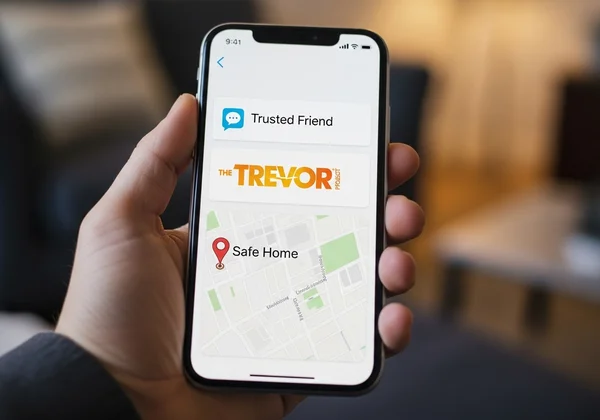Coming Out to Parents Safely: LGBTQ+ Teen Advice & Sexual Orientation Quiz Guidance
September 7, 2025 | By Riley Foster
Taking the courageous step of coming out to parents is a significant moment in your self-discovery journey. It can bring a mix of emotions – excitement, anxiety, hope, and fear. How do you know if you're ready to tell your parents? This guide is designed to offer compassionate, practical, and safety-first advice for young LGBTQ+ individuals considering sharing their truth with their families. Your journey is valid, and preparing for this conversation can empower you to navigate it with confidence.
Before you take this step, understanding your own feelings is crucial. A great starting point can be a private self-reflection tool, like a gay test, to gain more clarity. Consider exploring your identity with a free and confidential LGBTQ+ orientation quiz to gain more clarity.

Preparing to Tell Your Parents You're LGBTQ+
Taking a moment to prepare thoughtfully can really set the stage for a positive conversation. It's not about planning a perfect speech, but about grounding yourself emotionally and logistically. Giving yourself this time and space is an act of self-care that honors the importance of this moment in your life. Rushing into it can add unnecessary stress, so let's walk through how to prepare in a way that feels right for you.
Understanding Your Feelings & Why You Want to Share
First, take a moment for self-reflection. Ask yourself why you want to come out to your parents right now. Is it because you want to live more authentically? Are you hoping to build a deeper, more honest relationship with them? Or perhaps you're tired of hiding a part of who you are. Understanding your motivation will help you articulate your feelings more clearly during the conversation. Journaling about your identity and feelings can be an incredibly helpful exercise in this stage of your personal journey.
Choosing the Right Time and Place for the Conversation
Timing and environment can significantly impact how the conversation unfolds. Look for a right time and place that is calm, private, and free from distractions. Avoid bringing it up during a heated argument, a stressful family event, or when anyone is rushed. A quiet evening at home or a peaceful walk might provide the neutral and relaxed setting you need. The goal is to create an atmosphere where everyone feels they can speak and listen without pressure.
Gathering Your Support System Beforehand
You don't have to do this alone. Before you talk to your parents, identify your support system. This could be a trusted friend, a supportive relative, a school counselor, or an online LGBTQ+ community. Let someone know about your plan and ask them to be available to talk afterward, regardless of the outcome. Having this safety net in place provides an essential emotional cushion and reminds you that you are part of a caring community. You can always explore your identity with tools and resources built by people who understand.

Prioritizing Your Safety: Safe Coming Out Tips
Your physical and emotional safety is the number one priority. While we all hope for unconditional love and acceptance, it's vital to be prepared for all possibilities. These safe coming out tips are not meant to scare you, but to empower you with a plan, ensuring you remain protected throughout this process. Honoring your need for safety is a sign of strength and self-respect.
Assessing Your Home Environment & Parental Temperament
Take an honest look at your home environment. How have your parents spoken about LGBTQ+ people or issues in the past? Are they generally open-minded, or do they hold more traditional views? This helps you get a better sense of how they might react. You can test the waters by bringing up a news story about an LGBTQ+ celebrity or a related topic to gauge their response without making it personal just yet.
Having a Backup Plan: Resources and Safe Spaces
A solid backup plan is your most important safety tool. If you fear a highly negative reaction that could compromise your safety or housing, it is crucial to prepare. Identify a safe space you can go to, such as the home of a trusted friend or relative. Keep the phone numbers of local LGBTQ+ youth centers or crisis hotlines like The Trevor Project saved in your phone. Knowing you have options provides a sense of security and control.

Protecting Your Emotional Well-being Through the Process
Coming out is emotionally taxing, no matter the outcome. Focus on protecting your emotional well-being. Practice self-care activities that soothe you, whether it's listening to music, going for a run, or drawing. Remind yourself that your worth is not defined by anyone else's reaction. Your identity is valid, and you deserve to be treated with respect. Taking a gay quiz online can be a simple, private way to affirm your feelings before sharing them with others.
Navigating Parental Reactions & Seeking Support
After you've shared your truth, the conversation continues. Navigating your parents' reactions requires patience, courage, and ongoing self-affirmation. This phase is about managing expectations and remembering that their initial response may not be their final one. This is a journey for them as well, and your role is to stay true to yourself while giving them space to process.
Common Parental Responses to an LGBTQ+ Disclosure
Parental reactions can range from immediate acceptance to shock, confusion, denial, or even anger. Some parents may express love but ask you not to tell others. Some might need time and education to understand. Others may have questions, some of which could feel insensitive. Preparing yourself for this spectrum of possibilities can help you stay grounded and react less from a place of surprise or hurt.
Strategies for Difficult Conversations and Disagreements
If you encounter difficult conversations, try to remain as calm as possible. Use "I" statements to express your feelings without placing blame (e.g., "I feel hurt when you say that" instead of "You are hurting me"). It's okay to end the conversation if it becomes unproductive or hostile. You can say, "I can see this is a lot to process. Maybe we can talk more about this later." Offering them resources like PFLAG (Parents, Families, and Friends of Lesbians and Gays) can also be a helpful, non-confrontational step.
Remember Your Worth: You Are Valid and Loved
Above all, practice self-acceptance. Your sexual orientation is a beautiful part of who you are. Regardless of how your parents react, you are valid, you are worthy of love, and you are not alone. Connect with your support system, celebrate who you are, and continue to explore your identity with confidence. Your journey of self-discovery is yours to own and cherish. You can always find support through communities and tools designed for you.

Your Journey, Your Pace: Embracing Authenticity
Coming out to your parents is a deeply personal decision, and there is no right or wrong timeline. Your journey is yours alone, and the most important thing is to honor your feelings and prioritize your safety every step of the way. This is one moment in a lifelong journey of embracing your most authentic self.
Continue to explore who you are, connect with people who lift you up, and be proud of the person you are becoming. If you are still exploring your feelings or want to gain deeper insights, our free online gay test is a safe and confidential resource created to support you.
Frequently Asked Questions About Coming Out to Parents
How do I know if I'm truly ready to tell my parents I'm LGBTQ+?
You are likely ready when the desire to live authentically outweighs the fear of their reaction, and you have a solid support system and safety plan in place. Readiness is less about certainty and more about feeling prepared to handle various outcomes. Using a tool like an am I gay test can be a personal step in building that certainty for yourself first.
Is it normal to question my sexuality even after I've told my parents?
Absolutely. Coming out is not the end of your journey of self-discovery. Sexuality can be fluid, and it's completely normal to continue learning and evolving. Your feelings are valid, and allowing yourself to question and explore is a healthy part of understanding your identity over time.
What if my parents react negatively or don't understand my identity?
If your parents react negatively, your immediate priority is your safety. Lean on your support system and activate your backup plan if needed. Remember that their initial reaction may stem from fear or lack of understanding, and it may change over time. Provide them with educational resources, but focus on protecting your own well-being first and foremost.
Can my sexual orientation change over time, and how do I explain that to my parents?
Yes, for some people, sexual orientation can be fluid and change over time. You can explain this by using the metaphor of a journey or a spectrum. You might say, "Just like other parts of me have grown and changed, my understanding of who I'm attracted to has also evolved. This is who I am right now." Your identity is your truth, and you don't need to have all the answers to be valid.